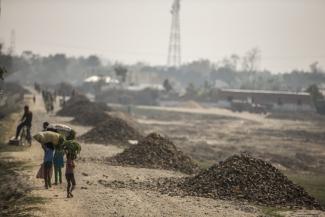
Do the preparation task first. Then read the article and do the exercises.
Preparation
Blood and Earth
In his book Blood and Earth, Kevin Bales speaks with Ibrahim, a 23-year-old slave who has worked in a gold mine since he was nine. He is dying. His lungs are filled with liquid caused by the dust and bacteria in the mine. As their conversation ends, Ibrahim turns to Kevin Bales and says, 'I want to be remembered. When my story is written and your book is ready, will you send me a copy? I want to show it to others, to show them that I am not completely useless. I just want to show that something good can come out of my life.'
So what's the connection to you? As you read this article, you are probably using a smartphone, tablet, or laptop. Each device requires minerals – including gold. Perhaps the gold in your electronic device was mined by slaves.
Slavery today
According to the Global Slavery Index 2018, over 40 million people are victims of modern slavery, and of these, 15 million are in forced marriage. Slavery involves violence, physical or psychological, and control – often in the form of threats in order to generate profit. To quote Kevin Bales, 'Slavery is when one person controls another, uses violence to maintain that control and exploits them economically.' This violence may be physical and/or psychological, and the control may be verbal threats – but at the heart of slavery is exploitation and 'ownership' of another human being for profit. Forms of modern slavery include forced labour, human trafficking, commercial sexual exploitation, domestic servitude and forced marriage.
You might be surprised to see forced marriage included above. Sadly, forced marriage involves the same lack of choice, power imbalance, coercion and labour exploitation as other forms of slavery. This also includes forced child marriage – usually of girls, of 17 years or younger.
Slavery behind closed doors
Another form of slavery is domestic servitude. Across the globe, domestic workers, mostly women, migrate abroad to support their families back home. Employment agents in their country of origin promise a generous salary and good working conditions with a caring host family. This, however, may be far from reality. Domestic workers are sometimes forced to work long hours and their passports and mobile phones are taken away. In extreme cases, behind closed doors of private homes, they are locked up, starved, deprived of sleep and often physically and sexually abused. They are trapped, scared and unfamiliar with their new surroundings. Domestic servitude happens globally, including in the UK.
The power of consumer choice
Every item we buy has a back story. From electronics to textiles, from handmade carpets to coffee, tea and chocolate, each of these products might include child or adult slavery. Consider a product as innocent as chocolate. While the chocolate bar itself may have been produced in your country, the cocoa in the chocolate probably came from West Africa, where 60 per cent of the world's cocoa is produced. As you read this, thousands of children and adults live in slave-like conditions on cocoa farms. Unknowingly, your purchase might support slavery. However, consumer demand for ethically-sourced products and services can send a powerful message to producers. Imagine if we all refused to purchase goods that have a back story of slavery. Company sales, and therefore profits, would fall. Look around at items in your home and workplace and ask yourself the simple question, 'Where did this come from and who made it?'
Why didn't I learn about modern slavery at school?
Did you ever learn about modern slavery at school? History lessons may have included the horrific practice of slavery, however, it was probably considered something that was very much 'in the past'. But slavery still exists and it is the everyday reality for millions of people. It takes brave educators to raise awareness of the difficult, upsetting and invisible reality of modern slavery.
The good news is that thousands of individuals and anti-slavery organisations are taking action. One such organisation is The NO Project, which focuses specifically on the education of youth and young adults. 'Youth are the next generation of corporate leaders, policy makers and consumers,' says the founder of The NO Project. 'How we choose to spend our money says a lot about who we are. So, the question is – who are we? And remember, another time, in another place, that enslaved human being could be you.'
Sources:
- https://www.un.org/en/observances/slavery-abolition-day
- https://www.thenoproject.org/
- https://www.nottingham.ac.uk/research/beacons-of-excellence/rights-lab/index.aspx
- http://www.karmanirvana.org.uk
- http://www.kevinbales.net/blood-and-earth.html (Quotes in the text are taken from Blood and Earth: Modern Slavery, Ecocide and the Secret to Saving the World by Kevin Bales, Penguin Random House 2016.)
- https://www.globalslaveryindex.org/




I learned from this article, what Islam taught us to treat others in the way we like to be treated.
Regards.